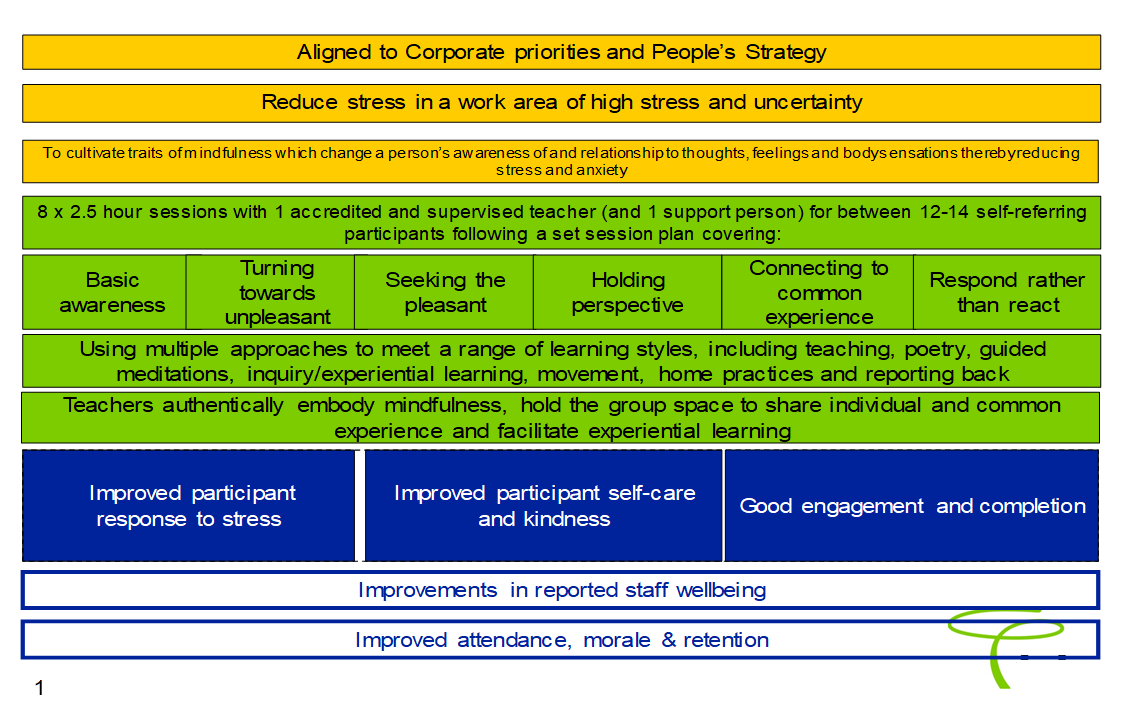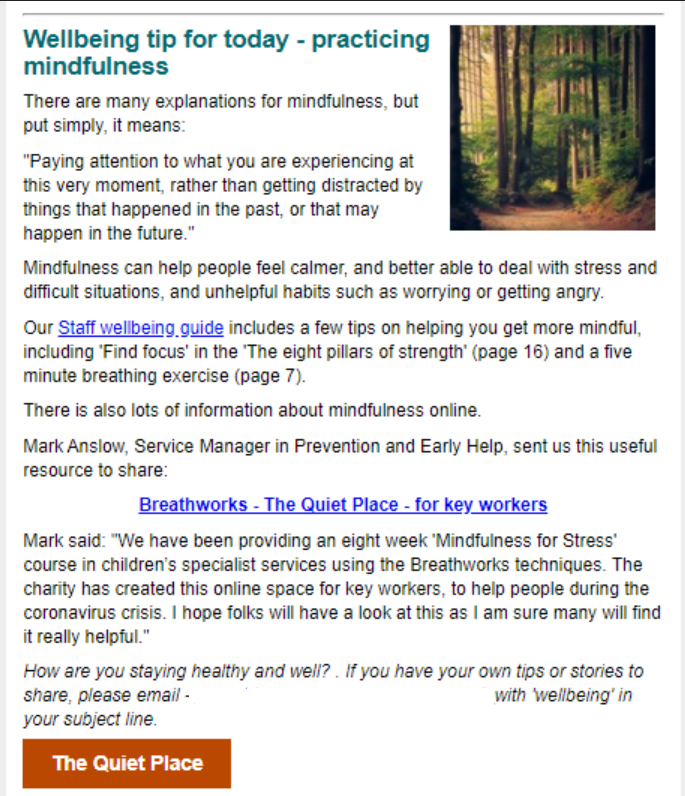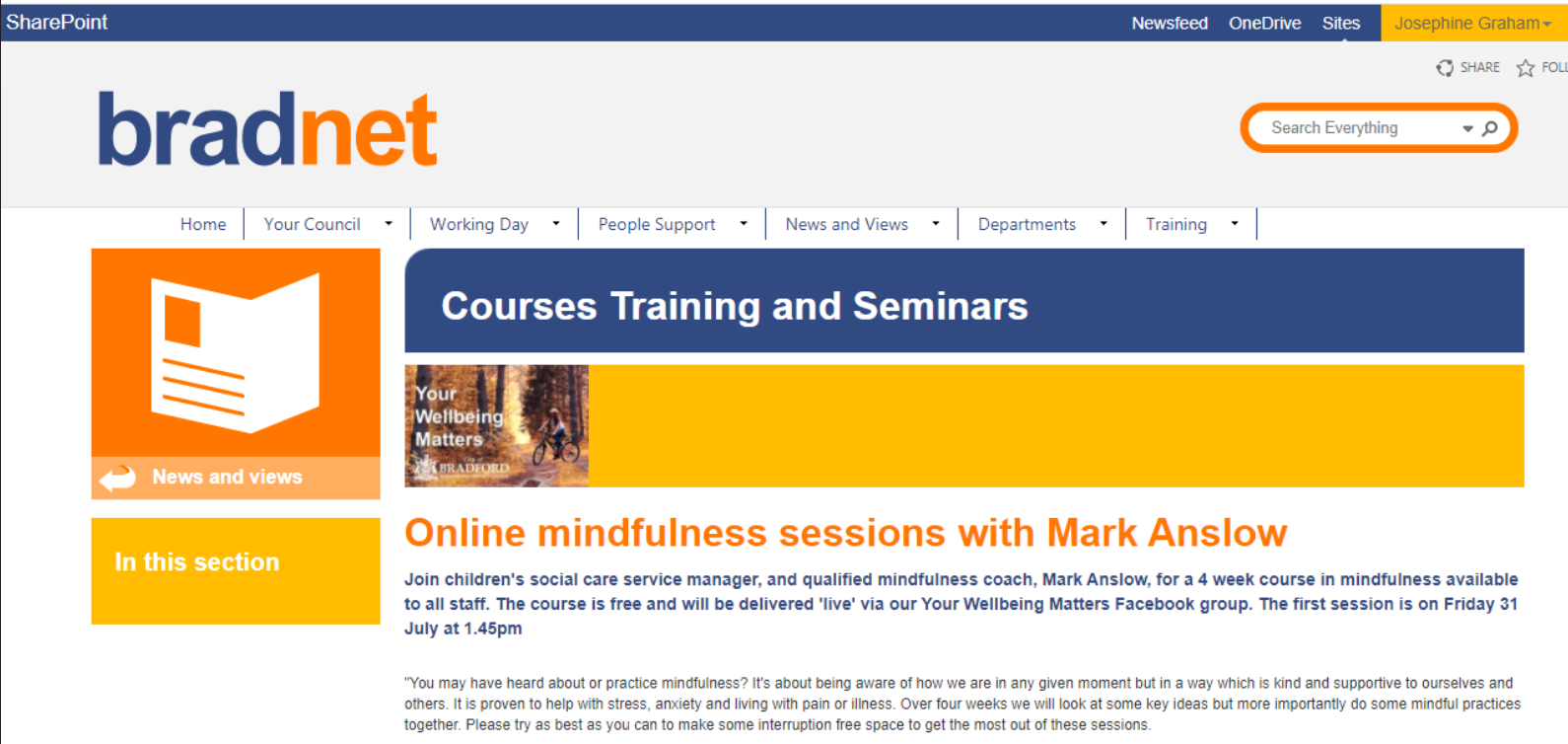Mental wellbeing at work is determined by the interaction between the working environment, the nature of the work and the individual (NICE PH22). However, mental ill health is particularly prevalent in the public sector, with 72% of public sector employers reporting an increase in the last year, Health, Wellbeing & Mindfulness (Briefing Paper, the Mindfulness Initiative, 2019).
The NICE quality standard ‘Healthy workplaces: improving employee mental and physical health and wellbeing’ (QS147) recommends that organisations should develop workplace solutions to reduce the risk of stress and they should identify when to provide additional support.
The Children and Families Principal Social Worker (PSW) at Bradford Council wanted a focus on mindfulness for stress, as experienced by practitioners in the children’s social care services, including the early help and social work teams. A pilot of three 8-week mindfulness for stress training sessions is being completed, with the third cohort to complete training by the end of 2020.
During COVID-19, mindfulness has been an invaluable part of the response to support employees’ wellbeing. It is recommended through the Employee Health and Wellbeing Service and links to on-line mindfulness programmes have been provided through corporate wellbeing updates and guidance. An introduction to mindfulness has also been delivered through the Council’s Employee Wellbeing Facebook Group and weekly drop-in meditations are now available through that group.
Example
Aims and objectives
The overall objective was to address stress, including associated anxiety, and mental wellbeing, for our children’s social care practitioners. The NICE Healthy Workplaces Quality Standard (QS147) defines stress:
‘Stress is a natural, but sometimes distressing, reaction leading to a psychological and physiological tension that is referred to as the 'flight or fight' response. It may be positive or negative. Stress has many causes. Some may be work-related, for example, excessive workload and a poor work–home balance. Other factors include financial worries or family issues. In most cases (and with appropriate help) people will adapt and cope. However, sometimes stress can lead to psychological or physical health problems.’
Mindfulness is a capacity which everyone holds to differing degrees and which can be developed through practice and training. Mindfulness can be defined as, ‘This capacity enables people to attend intentionally to present moment experiences, inside themselves as well as their environment, with an attitude of openness, curiosity and care’, (Field book for Mindfulness Innovators, 2019).
The scoping document for the update of the NICE guidance on Mental wellbeing at work (PH22) refers to mindfulness training as an example of a health risk reduction and promotion programme for employees. It was also noted that NICE guidance for depression (CG90) refers to mindfulness-based cognitive therapy (MBCT) as a psychological intervention for relapse prevention for people who are significantly at risk of relapse.
By teaching principles of mindfulness and integrating this into daily reflective practice we hoped to improve worker’s wellbeing and response to stress and, in turn, reduce levels of sickness absence for children’s social care practitioners. Through prioritising the wellbeing of the children’s social care workforce we hoped to build their resilience to issues in their professional and private lives which may include following up issues on how they can best secure their wellbeing at work with their line manager.
Although the mindfulness interventions were planned before COVID-19, the additional stresses associated with the pandemic and the isolation from working remotely, meant that the wellbeing of our children’s social care practitioners was critical. During COVID-19 we have been extending our mindfulness informed guidance across the council and hope that it can be used as part of wider corporate wellbeing plans over time.
Reasons for implementing your project
As outlined above, mental ill health is very prevalent in the public sector. A particular area of high concern is the level of mental ill health, stress, burnout, risk of suicide and high turnover in staff in medical and caring professions and people exposed to trauma through their work in the blue light or military services, Health, Wellbeing & Mindfulness (Briefing Paper, the Mindfulness Initiative, 2019). Children and family social work workforce statistics for the year ending 30 September 2019 show that the national absence rate was 3.1%, with Yorkshire and the Humber having the highest regional rate of 4.2%, Official statistics: Children and Family social work workforce in England, year ending 30 September 2019 (Department for Education, 2020).
Given the stress related to working in social care and the additional local pressures from working in the 5th most income deprived local authority in England, Poverty and deprivation (City of Bradford Metropolitan District Council Intelligence Bulletin, 2020), Bradford Council’s PSW wanted a focus on mindfulness for stress, as can be experienced in the children’s social care services.
How did you implement the project
Participants were asked to complete the following standardised measures at the start, end and at a further 6-month follow up point as part of Breathworks’ national evaluation. These measures cover both elements of physical and mental health and people’s subjective emotional and psychological experiences:
- Brief Fatigue Inventory
- WHO-5 (quality of life)
- Hospital Anxiety and Depression scale
- UCLA Loneliness Scale
- Self-compassion Scale
- Five-Facet Mindfulness Questionnaire
By the end of the course and beyond it is expected that participants will experience positive changes in regard to:
- their awareness of and relationship to thoughts and perceptions which bias them towards stress and anxiety
- increased self-kindness and care
- increased body and body/mind awareness
- reduced stress and improved attendance
- improved relationships
Key points from Bradford’s mindfulness course:

Expressions of interest to take part in the course were sought across children’s social care, with front line social workers being targeted.
Employees attending course were asked to contribute to the Breathworks’ national evaluation, for which we will be provided with anonymised local overview findings.
Mindfulness and wellbeing during COVID-19:
Weekly meditations have been offered to those who completed cohorts one and two, though typically only 3-4 people attend each session. There is the ongoing challenge of employees protecting time and space within busy working days.
The EHWB colleague who attended cohort one is part of the council's COVID-19 Working Group.
Links to online mindfulness course resources were shared across corporate intranet updates and in the council's email newsletter, for example:

Over August, 4 weekly 45-minute introduction to mindfulness sessions were delivered via Bradford Council's Facebook wellbeing page and promoted on the council's staff intranet:

Key findings
Feedback from staff who attended the first two cohorts has been very positive:
“If there is one common theme I took away, it’s to be kind to yourself as well as others...”
“I feel like learning mindfulness has changed me so much…I have more power to choose how I respond to situations. I have been able to focus more at work, to separate work/home life, looking after myself more, more confident, more assertive learning, to accept difficult thoughts and memories and be kinder to myself. I feel kinder to other people. Thank you so much it really has made a huge difference for me …”
“Usefulness of meditation and being able to remember to come back to the moment can really help stress relief and in our roles, this is hugely important. Breathing exercises, having drop box exercise booklet really fantastic.”
“This course has helped me enormously in terms of teaching me techniques I can use both in my work life and at home, reminding me how self-care is (important) during these uncertain and often challenging times”.
“I feel I am able to use the skills I learnt from this and bring myself back into the moment (here and now) without ruminating and becoming anxious.”
“Better understanding of the reasons we are negatively biased, understanding this means I am starting to be less critical of myself. I also think understanding the secondary stresses means I'm catching myself if I fall into this and stopping myself.”
The meditation resource which was included in the council’s email newsletter during COVID-1, generated 66 clicks and was the second most popular link in the newsletter.
Key learning points
Employees who took part in the first two cohorts made suggestions about how the course could be improved and expanded to ensure that learning is embedded across children’s social care services:
- to prioritise children’s social care managers given additional stress and pressure they often face
- to consider refresher sessions
- to give more emphasis to the practices and knowledge behind theories discussed on the course
- to ensure that learning from the course can be embedded through protected quality time
As outlined above, given the positive feedback from staff who completed the first two cohorts of training, mindfulness was introduced as a strategy to support all of Bradford Council’s workforce during COVID-19.